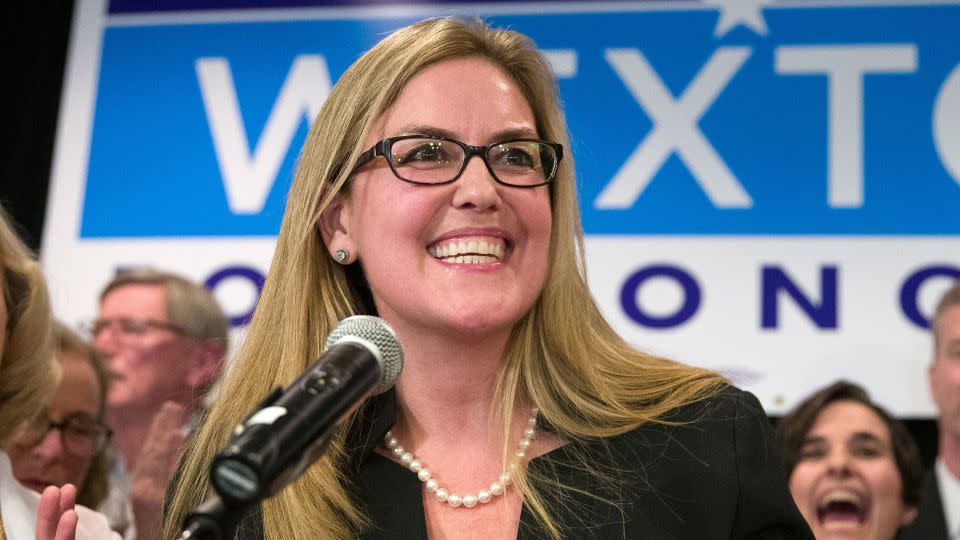Opinion: The 2,000-year-old advice for coping in 2023
- Oops!Something went wrong.Please try again later.
- Oops!Something went wrong.Please try again later.
- Oops!Something went wrong.Please try again later.
- Oops!Something went wrong.Please try again later.
- Oops!Something went wrong.Please try again later.
- Oops!Something went wrong.Please try again later.
- Oops!Something went wrong.Please try again later.
Editor’s Note: Sign up to get this weekly column as a newsletter. We’re looking back at the strongest, smartest opinion takes of the week from CNN and other outlets.
“A mind that is anxious about the future and unhappy before misfortune even arrives is a disaster,” wrote the Stoic philosopher Lucius Annaeus Seneca. It will never be at rest, and while overwhelmed with worry, it will “lose the present things that it could enjoy.”
A pivotal political figure in first-century Rome, Seneca indeed had much to worry about, along with wealth and prominence to enjoy. He earned the distinction of offending three emperors: Caligula nearly ordered his death. Claudius banished him. And Nero, who once was his pupil, ultimately commanded him to commit suicide.
For those unable to take Seneca’s advice to abandon anxiety, there’s plenty to fret about in our time — from immediate concerns like the Ukraine war, labor strikes in various industries and a possible US government shutdown to the existential threats of climate change and nuclear weapons.
Yes, we have more modern voices advising us — how can we forget Bobby McFerrin’s musing in his 1988 hit, “Don’t Worry, Be Happy” that “In every life we have some trouble, but when you worry, you make it double”? Yet there’s something reassuring about a voice that resonates across a span of 2,000 years, of someone who contended with strife in a world utterly remote from and in some ways strikingly familiar to our own.
It turns out that quite a few people are thinking about the world of ancient Rome. As historian David M. Perry pointed out, “a viral trend has swept through TikTok in which women asked their husbands and boyfriends how often they thought about the Roman Empire. A surprising number claimed to think about the ancient empire as often as ‘every day’ or least every week or two. It became a meme (are you even in a relationship if she hasn’t asked you about the Roman Empire?), spread to other social media sites, then received serious news coverage in multiple outlets. Now it seems like it’s everywhere.”
In the Financial Times, Jo Ellison explained that, judging by TikTok posts, “men are in awe of all the Romans achieved. They marvel at their absolute dominion, their mastery of every strand of civilisation — and then how that power suddenly slipped away. Some see metaphorical comparisons: are we poised at the end of another epoch? Others think about the Stoics. Who knew Marcus Aurelius would be such an influencer? The millions of men who subscribe to apps daily offering his wisdoms, that’s who.”
Podcasts, books, movies have all fed the appetite, David Perry noted. “There’s just a lot (in a fairly narrow band) of Greek and Roman history to easily consume. What’s more, a small selection of surviving primary sources for the late Roman Republic and early empire are fun to read, lurid in sex and violence and available in cheap paperback translations.
Yet while “people love history,” Perry lamented, “the studying and teaching of history at the university level is slowly vanishing” as students are told that college is all about preparing for a career.
A case in point is West Virginia University, which is sharply cutting programs and faculty in languages and other fields. As Paula M. Krebs, executive director of the Modern Language Association, wrote, “The cuts being made to the liberal arts at WVU will dramatically narrow educational opportunities not just for West Virginia students who want to major in humanities fields but also for STEM and business students. All students’ job prospects and lives are enriched by language study, writing instruction and the research and analytical skills taught in beginning and advanced literature and culture courses.”
Trump’s new risk
Former President Donald Trump’s drive for the Republican presidential nomination ran into an obstacle last week. In an interview on NBC’s “Meet the Press,” he struggled to craft a position on abortion that could keep conservatives on his side without alienating the independent voters crucial for winning a general election.
Trump’s criticism of Florida Gov. Ron DeSantis for signing a six-week abortion ban “raised eyebrows among many on the right who are cautioning the 2024 frontrunner against ticking off a voter base who helped him become president in the first place,” said SE Cupp.
“In that interview, Trump refused to endorse a specific number of weeks after which abortion would be illegal and refused to commit to a federal ban. … he promised that ‘both sides are going to come together’ and ‘for the first time in 52 years, you’ll have an issue that we can put behind us.’”
“Now,” Cupp continued, “this was not music to the pro-life movement’s ears. They don’t want compromise. They don’t want negotiations. They don’t want to back down from the argument or to put it behind us. They want to fight.”
As president, Trump appointed three conservative Supreme Court justices who went on to help overturn Roe v. Wade, a fact he likes to trumpet, but now he’s seeing the potential downside of winning in the court as he eyes another run for the White House.
Cupp asked, “Does Trump want to dump his own position now that he’s seen the collateral damage of the GOP’s extreme abortion bills? Or does he stand with his base, and back the things they elected him to do — appoint pro-life judges, overturn Roe and push to make abortion illegal?”
For more:
Dean Obeidallah: Trump’s gaffes should raise questions about his fitness for office
Patrick T. Brown: The parents’ rights movement needs to avoid this tea party mistake

Rupert Murdoch
Media mogul Rupert Murdoch announced Thursday that he was stepping back from running the company that owns Fox News and becoming chairman emeritus instead. The 92-year-old put his son Lachlan Murdoch, 52, in charge.
As media critic David Zurawik noted, “There was room on cable TV in the 1990s for a channel that featured conservative voices, no doubt about it. But from its very inception with (Rupert) Murdoch naming Roger Ailes as its chief executive, Fox News was primarily a political, not journalistic, operation. Ailes, who helped Richard Nixon get elected president in 1968, specialized in the political use of media.”
Murdoch “gave Ailes free rein to do whatever it took to put Fox News on the map, another major part of Murdoch’s legacy that we should not overlook: He opened the cable news floodgates to propaganda, misinformation and disinformation. And he laid down the template for what has become a powerful right-wing messaging machine.”
“And look where we are now as we struggle to find media platforms we can trust in an effort to make sense of beyond-the-pale-political actions like the attack on the Capitol on Jan. 6, 2021, or the refusal of a defeated president to promote a peaceful transfer of power.”
Shutdown looming?

House Speaker Kevin McCarthy sent his fractious band of Republicans home for the weekend after failing to rally enough support behind a strategy to prevent a government shutdown next weekend.
“That McCarthy’s best effort wasn’t actually very good hardly matters,” wrote Democratic strategist Max Burns. “Former President Donald Trump had already made clear to his loyalists that he expected them to reject any continuing resolution to fund the government. In today’s MAGA-fied Republican Party, Trump’s directive proved more than enough to derail the legislative process … The fact that shutdown threats are now a fact of political life in Washington is not a failure of government, but a failure of the Republican Party to police its own extremism.”

Casual dress code

“I will continue to wear a suit,” declared a forlorn Senate Majority Leader Chuck Schumer, as he let loose the demons of casual wear in a legislative body that has long had rules about proper dress.
Culture writer Elena Sheppard at first reacted negatively to Schumer’s announcement.
“I imagined elected officials milling around in cargo shorts and Carhartt sweatshirts — aka what Sen. John Fetterman calls ‘Western PA business casual’ — or wearing their pajamas to a vote. I thought about how this green light to dress down would devalue the importance of this legislative body and their responsibility to American citizens.”
“And then I realized my worries made no sense. Style is ever-changing, politics are ever-evolving and attire getting more casual is an age-old complaint…”
“Over the years, other dress code changes have occurred in the Senate without disaster. In 1993 female senators were — at last — permitted to wear pants on the Senate floor. In 2019 the Senate finally stopped enforcing a rule that prohibited female senators from baring their shoulders.”
And after all, Fetterman promised to wear a suit on the Senate floor if Republicans “stop trying to shut our government down, and fully support Ukraine.”
The sister

As Kim Jong Un visited Russia’s far east to meet with President Vladimir Putin, one woman stood out — the North Korean leader’s sister Kim Yo Jong. She is the subject of a new book, “The Sister,” by Sung-Yoon Lee, a longtime observer of North Korea.
“Kim Yo Jong is the first preeminent and powerful female figure to emerge in the brutish, male-dominated political landscape of North Korea, ruled by the Kim family for 75 years,” he observed.
“Since 2020, she has governed as the de facto Number Two royal in the dynasty, second only to her brother, Kim Jong Un.”
“Young, photogenic, smart and acerbic, Ms. Kim appears to exercise real power — with a vituperative verbal twist. She is prone to making threats of nuclear strikes against the South and is undoubtedly the most powerful woman in North Korea today.”
The son
Hunter Biden isn’t the first presidential child with problems, noted Alexis Coe. President George Washington’s stepson was so ill-behaved that his tutor wrote, “I never did in my Life know a Youth so exceedingly indolent, or so surprisingly voluptuous,” and the first president found even more faults with his stepgrandson.
James Madison, Abraham Lincoln, Teddy Roosevelt, Ronald Reagan and George H.W. Bush all had children who proved problematic in one way or another. But what makes Hunter Biden’s case stand apart is the way in which the opposing party has sought to use his troubles against his father.
“Republicans are betting that … Hunter, the first wayward offspring of a sitting president to be charged by the Justice Department, will cost his father dearly in the political arena. American history tells us a different story: Bad presidential sons are as old as the nation itself, yet political opponents have never thought weaponizing them would win an election.” And it remains to be seen whether Hunter Biden’s woes will actually cost President Joe Biden at the ballot box.
An Iran deal
President Biden faced criticism from Republicans over the terms of the deal he cut with Iran to free five Americans. In particular, Peter Bergen noted, “former Vice President Mike Pence, who is running in the 2024 Republican presidential primaries, criticized … Biden for agreeing to unfreeze $6 billion of Iranian funds in exchange for the five American prisoners.”
“Pence’s critique of the Biden administration ignores the fact that the $6 billion of Iranian funds belongs to Iran for its overseas oil sales, and the funds that are being unfrozen will not go to Iran but to Qatar, where the Qatari government will administer them to be used only for humanitarian purposes in Iran, according to Biden administration officials.”
The reality, Bergen wrote, is that Biden had no choice but to try to strike a deal since “the highest responsibility of the US commander in chief is the protection of American citizens … Consider that four of the Americans released on Monday were held in the notorious Evin prison, where torture is common, according to Amnesty International. Three of the men were held for more than five years by the Iranians.”

Addiction crisis
America is in an addiction crisis — with more than 109,000 people dying of overdoses in the 12-month period ending in April.
Actors Martin Sheen and Melissa Fitzgerald borrowed a line from the A.R. Gurney play “Love Letters,” which they’re performing this week at the John F. Kennedy Center in Washington. The play’s female character, also named Melissa, who has struggled with substance use and depression, writes to Sheen’s character, Andy: “They say I’m dancing on the edge of an abyss. You’d better stay away, I might take you with me when I fall.”
The actors wrote, “Addiction is often described as the loss of connection; an unraveling of trust and untethering from community. For individuals and their loved ones, it is, indeed, the abyss. To those experiencing it firsthand, and those bearing witness to its devastation, addiction can feel insurmountable.”
There is hope too. “We have also seen the unmistakable joy of life in recovery; a joy that radiates beyond the individual and shines on families, friendships and communities. The over 20 million people living in recovery are testaments to the resilience of the soul. They light the way for others and remind us all that behind every struggle is a human being deserving of empathy and support.”
Ukraine war’s stakes
Eighteen months into the Ukraine war, the stakes remain huge. Speaking to the UN General Assembly, Biden warned, “If we allow Ukraine to be carved up, is the independence of any nation secure? I respectfully suggest the answer is no.”
Michael Bociurkiw wrote that Biden’s underlying message was that “if Russia is able to get away with its aggression in Ukraine and if world leaders avert their gaze from what is happening and allow the rules-based order to crumble, we won’t be able to achieve progress on climate change, poverty alleviation or anything else.”
Bociurkiw noted that in an interview on CBS, Ukraine’s President Volodymyr Zelensky “voiced annoyance at the slow pace of western military assistance and worry that Moscow was trying to run down the clock to the next US election when a change in US leadership could bring an end to the war not in Ukraine’s favor.”
Although Zelensky visited Washington after his General Assembly speech, he didn’t score any breakthroughs with House Republicans skeptical of providing more aid. As Lanhee J. Chen noted, a CNN poll in July found that “60% of Republicans surveyed argued that the US has done enough for Ukraine and just 30% favored providing additional weapons to Kyiv.”
Chen wrote, “Some of the blame lies with Ukrainian leadership for a failure to clearly communicate their own plans and transparently account for where existing US aid has been deployed. But perhaps more of the fault should be laid at the feet of Republican leaders who have failed to adequately explain to their own voters why continued involvement in Ukraine is an important priority amidst the many other fiscal and substantive challenges our nation faces.”
For more:
Keir Giles: It’ll take more than ‘wonder weapons’ to defeat Russia
Jennifer Wexton

At 55, Rep. Jennifer Wexton of Virginia isn’t running for reelection, despite her success five years ago in flipping a district that had been Republican for nearly 40 years. Jill Filipovic noted that the Democrat “was recently diagnosed with Progressive Supra-nuclear Palsy, a rare and ravaging neurological disorder, and is not responding well to treatment.”
Wexteon “has had a professional life centered on serving others, and on advocating for the needs of the vulnerable and the less-lucky. She has used her power for good, and has left her mark on her state and her country.”
“Wexton is now stepping back from this purpose-driven path to spend time with her family. She has two sons who reportedly come back from college each weekend to see her, a husband who supports her and a network of colleagues and friends rallying around her. These kinds of deep connections don’t come easy; both are hallmarks and building blocks of a well-lived life. That Wexton is choosing to spend time with her loved ones, rather than dedicate her last days to her job or the pursuit of power, says much about her character and her understanding of what’s actually important.”
Migrant surge

The surge of about 100,000 migrants from the southern border into New York City is straining relations between two key Democrats: President Biden and Mayor Eric Adams, wrote Julian Zelizer.
Biden on Wednesday took steps to speed up the ability of Venezuelans in the US to obtain work permits. “But it is time for the president, along with congressional Democrats to do more, and demonstrate how Democrats can offer a humane and economically constructive alternative to the hardline solutions of the GOP. If former President Donald Trump focused on building walls and separating migrant families, Biden must lead the Democrats in showing how the United States can be — and has been — a welcoming landing spot for persons fleeing political persecution and economic hardship.”
Don’t miss

Frida Ghitis: It doesn’t take an Agatha Christie detective to work out something’s up in Xi’s China
Adam H. Sobel: Why we’re seeing so many deadly floods
Holly Thomas: The mythology of Russell Brand is finally exposed
Akanksha Singh: What India’s possible name change is really all about
Dan Perry and Gilead Sher: The Netanyahu government’s next target is Israel’s free press
Gene Seymour: Jann Wenner’s incomplete pantheon of pop music ‘masters’
Reggie B. Walton: The fight against prison rape started 20 years ago. It’s far from over
Sidhi Dhanda: Why aren’t more teachers embracing AI?
AND…
The fight for the soul of country music

“I do the best I can,” Maren Morris sings on her new release. “But the more I hang around, the less I give a damn.”
Nicole Hemmer observed that Morris’ “indictment of country music, charted in two cleverly crafted country songs, is one of alienation and disaffection, of an industry too broken to be saved.”
“The powerful farewell by Morris, a chart-topping, multi-award-winning country singer, comes at a moment when the politics of country music are front-page news.” Songs like Jason Aldean’s “Try That In a Small Town,” and Oliver Anthony’s “Rich Men North of Richmond” have been embraced by conservatives.
“Rich Men,” Hemmer noted, “carried an antigovernment message so valuable to the right that Fox News used it as part of the opening question in the first Republican presidential primary debate in August — to the consternation of Anthony himself, who said, ‘It’s aggravating seeing people on conservative news try to identify with me, like I’m one of them.’”
Beyond individual songs, Hemmer wrote that there’s a “broader battle happening in the country music industry, between those seeking to deepen the industry’s ties to right-wing politics and those seeking to carve out a place for a more inclusive, more representative — and more historically rooted — version of Americana, folk and country music.” It’s clear where Maren Morris stands.
For more CNN news and newsletters create an account at CNN.com

